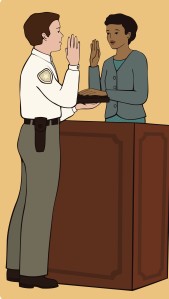by Tim Hallahan
Competence
Competence relates to witnesses, not to evidence. Two issues arise: (1) Is the witness competent to testify about a particular subject? (2) Is she competent to testify at all?
 Competence as to Subject Matter
Competence as to Subject Matter
The offering party must provide sufficient evidence of a witness’s personal knowledge of the facts about which she will testify before she does so. EC 702. The burden is to provide enough evidence so that the judge can determine that a jury could reasonably find personal knowledge. EC 403.
The proponent must establish the first two of each witness’s four testimonial capacities–that the witness perceived the fact (perception) and can testify about it from his own present recollection (memory). Such knowledge can be established from the witness’s own testimony or from any other admissible evidence; but merely asking the witness if he has personal knowledge is insufficient.
However, you’d never get through a trial if you established this foundation for every fact. You need to provide it only if there is an objection. Although judges rarely sustain objections as to personal knowledge if even a minimal showing is made, you should try to be as convincing as possible. If the evidence is important, provide a solid foundation for the witness’s ability to (1) observe details of the event, and (2) remember them accurately. “I was ten feet away. It stands out in my memory because I’ve never seen anything like that before or since.”
It’s necessary to establish personal knowledge for all witnesses except for qualified experts, who may base their opinions on facts about which they have no such knowledge.
Competence as a Witness
Every person is qualified to be a witness, irrespective of age, and no person is disqualified to testify to any matter, except as provided by statute (e.g., judges). Here the burden is on the opponent to establish that the witness does not have the third or fourth testimonial capacity–that she is incapable of communicating information understandably (communication) or does not understand her duty to tell the truth (sincerity). Children or people suffering from mental disabilities are not presumed to be incompetent.
If the opponent objects on this basis, the court will hold a hearing. Only a clear showing of incompetency will disqualify the witness. So if you intend to object, you’ll probably need an expert.
Lay Opinion
Generally a lay witness may testify only to facts she has personally observed; the fact-finder’s job is to draw inferences and conclusions from those facts. Occasionally, however, the line between fact and opinion blurs. And sometimes the fact-finder, in order to do the job well, needs to hear opinions from the witness. Therefore, the rules as to lay opinion testimony have been relaxed over the years. As a general rule, judges allow lay opinions if they are based on the witness’s own personal observations and are the type of conclusions lay people reliably draw in their everyday life, e.g., “The car was going over 70 miles per hour,” “He looked drunk.” EC 800
Permissible lay opinions can be sorted into those involving (1) Collective Fact, and (2) Skilled Observer. Collective fact opinions are conclusions that cannot be broken down into more incremental facts that can be easily verbalized or understood. The requirements are that (1) the witness personally observed the underlying factual data and drew from it a rational conclusion of the type that he and other lay people normally draw, and (2) the conclusion will be more helpful to the jury than merely the underlying data. Common examples include height, weight, identity, and distance.
The admissibility of the opinions of a skilled observer must meet the same requirements as above; in addition, judges often require more foundation in terms of experience than can be assumed from everyday living. For example, identifying a signature demands a showing of familiarity and experience with the person’s handwriting.
With both types of opinion, judges tend to err on the side of admissibility, leaving it to opposing counsel to demonstrate the unreliability of the conclusions on cross-examination. However, the closer the evidence comes to the ultimate issue in the case, the stricter the standard the judge will apply. The same principle applies to trial advocacy: the more important the evidence, the more concrete and fact-based the testimony should be.
Next Time
Next issue, I’ll discuss Form of the Question objections.
HOT BONUS: Try your hand at I Object! and I Object Again!: Criminal, my two online Qstream evidence courses. Go to www.QStream.com, sign up, and, over the course of a month or so, two questions will appear in your email box every few days. You can practice making rulings and sharpen your evidence knowledge. It’s fun, educational, and free.
Tim Hallahan is Director of the Trial Advocacy Program at Stanford Law School, a judicial education attorney with the California Judicial Council, a national CLE speaker, and cofounder of The Hecht Training Group, a litigation skills training firm (http://www.hechttraininggroup.com). He also serves on the ACBA CAAP Training Subcommittee.

